Suivi et évaluation
La plupart des défis liés au suivi et à l’évaluation, comme la quantité insuffisante d’investissements et le manque de capacités, ne sont pas spécifiques à l’assistance monétaire, mais ceux qui le sont concernent principalement le suivi des résultats des transferts non affectés. La flexibilité des transferts monétaires peut compliquer la définition d’indicateurs de résultats appropriés, qui pourraient impliquer un mélange d’indicateurs spécifiques au secteur et transversaux. En parallèle, il existe des limitations au moment de collecter des données précises sur la manière dont les transferts monétaires sont dépensés.
Les signataires du Grand Bargain se sont engagés à garantir que des mécanismes de suivi et d’évaluation pertinents des transferts monétaires soient en place, et à assurer une meilleure compréhension des coûts, avantages, impacts et risques de cette modalité par rapport à d’autres. En partant de cet engagement, le chantier du Grand Bargain sur les transferts monétaires a établi plusieurs points d’action, dont le développement d’indicateurs de résultats communs pour les transferts monétaires à usages multiples, et des indicateurs pour l’analyse de l’optimisation des ressources. L’analyse systématique de l’optimisation des ressources a été rendue difficile par plusieurs facteurs, dont un manque d’approches approuvées, le besoin en données sur les résultats en termes de qualité et le caractère intensif de l’analyse.
Priorités actuelles
Dans le cadre des engagements du chantier du Grand Bargain sur les transferts monétaires, le CALP Network a co-dirigé (avec l’USAID et CRS) la mise au point d’indicateurs de résultats des transferts monétaires à usages multiples. Le projet à tester est actuellement disponible en anglais, espagnol et français, via la bibliothèque.
Initiatives associées
Contenu présenté

Indicateurs de résultats des transferts monétaires à usages multiples : Projet final à tester
Guides et outils
Les indicateurs présentés dans ce document se concentrent sur les principaux objectifs des TMUM humanitaires et sur les résultats auxquels les transferts monétaires à usages multiples peuvent le plus fortement contribuer. (Par exemple, certaines interventions en TMUM visent à relier les personnes aux systèmes de protection sociale après la fin du TMUM; mais nous n’avons pas inclus...

Monitoring 4 CTP: Monitoring Guidance for CTP in Emergencies
Guidelines and Tools
This guidance provides a central resource to promote a common understanding of the most important monitoring considerations for humanitarian projects using cash transfer programming (CTP). The primary audience for this guidance is field-level practitioners, from organisations directly involved in the design, implementation, monitoring, and accountability of projects using cash and vouchers...

Cost-Efficiency Analysis of Basic Needs Programs: Best Practice Guidance for Humanitarian Agencies
Guidelines and Tools
The Efficiency, Effectiveness and Value for Money Sub-Workstream is pleased to share the final output on Cost-Efficiency Analysis of Basic Needs Programs: Best Practice Guidance for Humanitarian Agencies (attached).
Cost-efficiency analysis estimates the ratio of program costs to outputs created, allowing you to compare cost-per-output for programs which all produced the same output. Such...
Thematic lead
Contenu récent

MPG Monitoring Toolkit Development and Guidelines
Guidelines and Tools
This toolkit is designed to serve as a core resource for developing and conducting monitoring of MPG programmes. The tools themselves serve as templates and should be adapted to the local context and objectives of the specific MPG programmes to be monitored. Particular care should be taken to align...

Emergency Response Capacity (ERC) Consortium – Ethiopia: Building an evidence base on operational models for the delivery of CTP
Report
The Emergency Response Capacity (ERC) Consortium for the Uptake of MPGs is formed by Save the Children, the CALP Network, Danish Refugee Council, Mercy Corps, and OCHA with ECHO financing. Its primary aim is the improvement of capacity, coordination and evidence for multi-purpose cash grants through the...

Cash Based Assistance PQ Toolbox Now Live!
Blog Post
The CALP Network has developed a programme quality toolbox for cash-based assistance. The toolbox provides a set of common standards and acions for quality CBA. Each action is supported by a set of guidelines and ready to use tools and templates on 'how' to acheive quality CBA. It can be used across CBA...
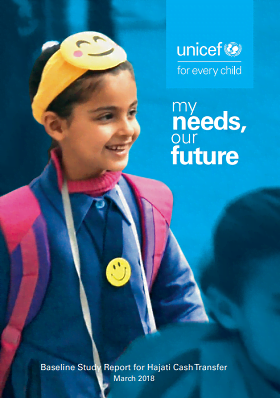
My Needs, Our Future
Report
Since the beginning of the 2017-2018 school year in Jordan, the United Nations Children’s Fund (UNICEF) Child Cash Grant (CCG) launched its new phase, an equity-driven, integrated social protection programme for all children in Jordan called Hajati, or ‘my need’ in Arabic. The new programme built on...
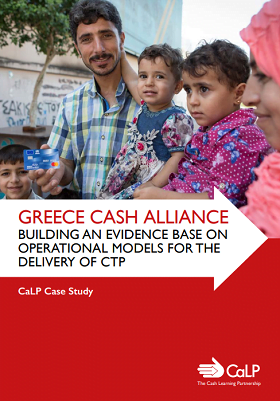
Greece Cash Alliance: Building an Evidence Base on Operational Models for the Delivery Of CTP
Report
The primary aim of this case study is to map out aspects of the Greece Cash Alliance (GCA) operational model influencing key drivers of quality (effectiveness, efficiency and accountability) in the delivery of multipurpose cash grants (MPGs). The GCA was launched in April 2017 with funding from ECHO, in...
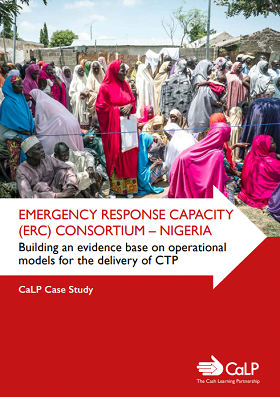
Emergency Response Capacity (ERC) Consortium – Nigeria: Building an evidence base on operational models for the delivery of CTP
Report
This case study aims to review and map out how aspects of the Enhanced Response Capacity (ERC) consortium model have influenced key drivers of quality (effectiveness, efficiency and accountability) in the consortium’s Nigeria pilot. Formed at the global level in 2015, the ERC Consortium is comprised of...
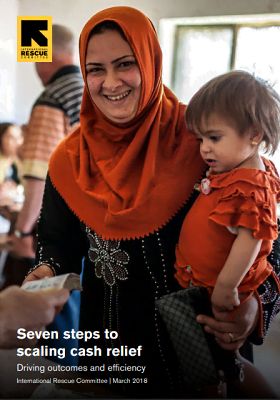
Seven Steps to Scaling Cash Relief: Driving Outcomes and Efficiency
Guidelines and Tools
As we approach the mid-point of our five-year strategy, this briefing explores the way in which the IRC has embraced cash relief programming and is seeking to drive efficiencies and maximise impact. It defines seven steps that the IRC has taken to scale cash relief. It goes on to argue that...
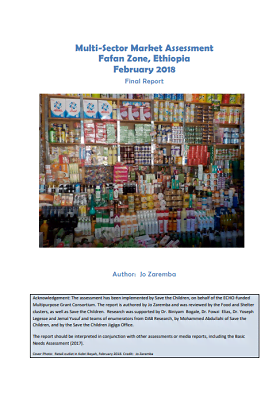
Multi-Sector Market Assessment Fafan Zone, Ethiopia
Report
This report covers the findings of the Multi-Sector Market Assessment (MSMA) conducted in Fafan Zone, Ethiopia in February and March 2018. The assignment formed part of the ERC-MPG Consortium on Approaches to Transformative Humanitarian Cash Transfer programming and is intended to support joint,...

Multi-Purpose Cash and Sectoral Outcomes: a Review of Evidence and Learning
Report
Growing attention to multi-purpose cash offers an exciting opportunity to redress a long-standing shortcoming of humanitarian response. There is a need to better understand and respond to crisis-affected people in a more holistic and coherent way, going beyond sectors to bring the emphasis back to how...

Human(itarian) Capital? Lessons on Better Connecting Humanitarian Assistance and Social Protection
Report
Governments in low- and middle-income countries are increasingly investing in social protection, and also address many of their own people’s “humanitarian” needs themselves. For their international partners, who may have an important role in filling gaps when household needs exceed national capacity...

Review of Food for Peace Market-Based Emergency Food Assistance Programs: Zimbabwe Case Study Report
Report
Zimbabwe reflects the recent Southern African drought crisis during a period of a regional El Niño-related drought and a national cash crisis. The United States Agency for International Development (USAID) Office of Food for Peace (FFP) funded a mix of programming between fiscal years 2011 and 2015,...
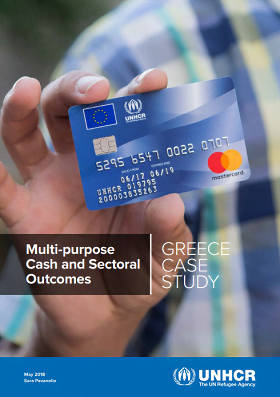
Multi-purpose Cash and Sectoral Outcomes – Greece case study
Report
Starting in 2015, the European Commission has been providing funding to support the humanitarian response in Greece through the Emergency Support to Integration & Accommodation’ (ESTIA) programme managed by its European Union Civil Protection and Humanitarian Aid (ECHO). ESTIA is implemented by UNHCR...

E-Transfer implementation guide
Guidelines and Tools
This updated E-transfer Implementation Guide replaces the original guide published in 2014. In cash transfer programming (CTP), electronic transfers (e-transfers) are a digital replacement for paper vouchers or physical cash. E-transfers are a disbursement mechanism – a way of transferring money, goods...
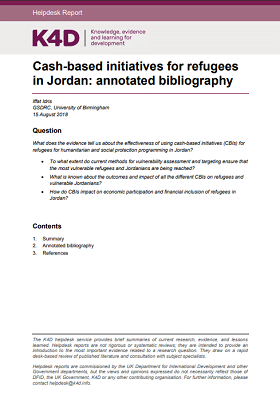
Cash-Based Initiatives for Refugees in Jordan: Annotated Bibliography
Report
The available literature tells us little about the effectiveness of targeting of cash-based initiatives (CBIs) for refugees in Jordan. However, it suggests there are positive impacts on food security for refugees, their ability to pay for rent and utilities and their psycho-social well-being, as well as...

Reflecting on the 2017 Drought Response and Cash Coordination in Kenya
Report
This report brings together thoughts and reflections on the use of cash in the drought response in Kenya in 2017/18 and consider how cash coordination might be strengthened in future. These are from a half day learning event organised by the CALP Network in liaison with the Chair and Co-Chair of the Kenya...
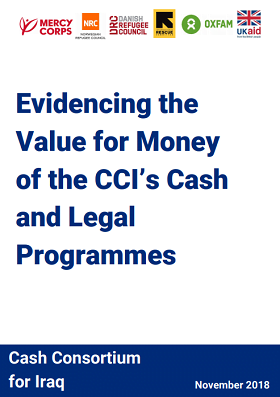
Evidencing the Value for Money of the CCI’s Cash and Legal Programmes
Report
Value for Money (VfM) considerations are an increasingly common requisite in humanitarian programmes. The UK’s Department for International Development (DFID) supports the adoption and scale-up of cash programming in humanitarian settings where appropriate, as both a more effective means for people to...

Cash-Based Programming in South Sudan
Report
This rapid review provides a synthesis of evaluations and learning reviews of cash-based programming in South Sudan. There is evidence that in South Sudan the cash-based programming help poor households address food needs and nutrition; and by injecting funds from vouchers, paid work, or grants into the...
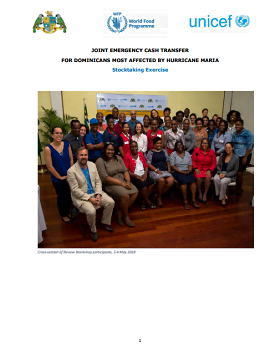
Joint Emergency Cash Transfer for Dominicans Most Affected by Hurricane Maria Stocktaking Exercise Report
Report
A workshop was organized in Roseau, Dominica on 3-4 May 2018, to bring together all the stakeholders involved at different levels and stages in the joint Emergency Cash Transfer programme that was implemented from December 2017 to March 2018 as part of the emergency response to Hurricane Maria. The report...

Social Accountability in the Delivery of Social Protection – Ethiopia case study
Report
Social accountability initiatives in two local areas in Ethiopia contributed to improvements in the service delivery of a social protection programme and state-society relations. But the social accountability mechanisms benefited the most marginalised citizens less. A new report by Development Pathways...
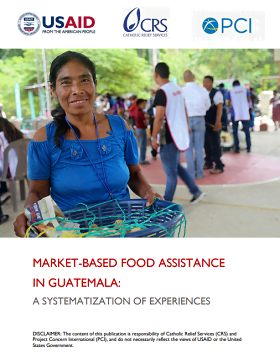
Market-based Food Assistance in Guatemala: A Systematization of Experiences
Guidelines and Tools
In April 2017, at the request of the United States Agency for International Development’s (USAID) Office of Food for Peace (FFP) in Guatemala, Catholic Relief Services (CRS) and Project Concern International (PCI) designed a process to gather and synthesize the experiences of food assistance...
